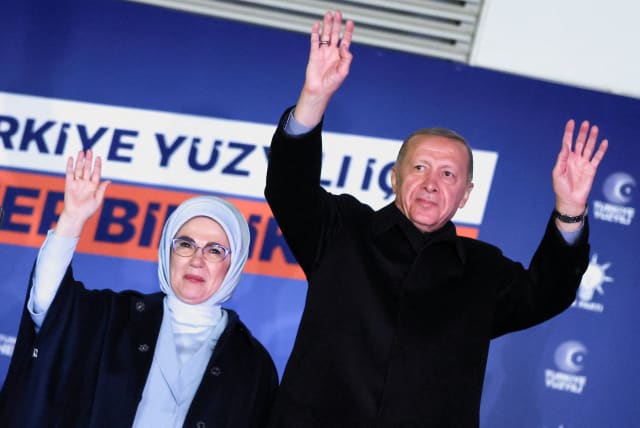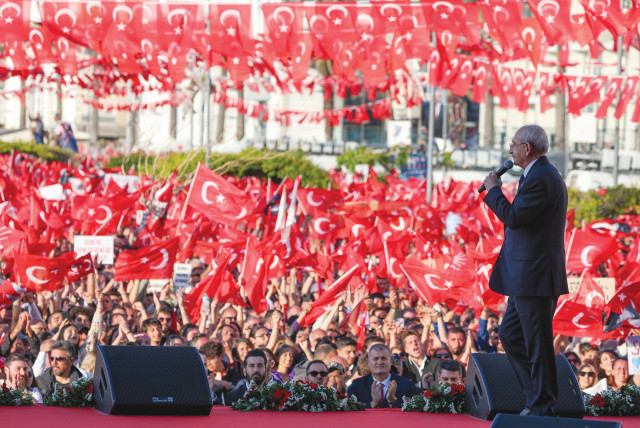Turkey heads to final run-off election - analysis

It’s unclear why hope for change vanished after May 14. By any standard, the fact that the party ruling the country for two decades can’t get fifty percent would seem to represent a loss.
Turkey is going to elections again on Sunday, two weeks after in elections on May 14 neither presidential candidate received more than fifty percent of the vote. In most countries, this would appear a failure for the ruling party and the long-time authoritarian leader of Turkey, Recep Tayyip Erdogan. However, most media accounts seem to take it as a fait accompli that Erdogan will defeat Kemal Kilicdaroglu.
Turkey’s media is largely controlled or influenced by the ruling AKP party which has been in power for two decades. Opposition politicians are often jailed on random charges. As such Ankara faces elections under circumstances that are not fully fair and democratic.
Yet Turkey’s state media says the opposite. Turkey’s TRT claims that it is “Western” media that has called into question Ankara’s elections and that Turkey must defy the West. The state media also heralds Erdogan’s success over the last two decades.
In the May 14 first round of the elections, both candidates got roughly a quarter of 100 million votes, adding up to more than 50 million, meaning turnout was high. The opposition candidate has successfully brought together historic secular nationalist voters and some on the left, including some of the Kurdish minority who are often suppressed in Turkey. However, the election has been tainted by a cloud of anti-migrant nationalism.
The third major candidate in the May vote, Sinan Ogan, is seen as one of many right-leaning voices in Turkish politics that is increasingly religious, nationalist and right-wing. As such many observers seem to think that Erdogan has a better chance of winning the runoff with Ogan now out of the way. The opposition leader Kilicdaroglu has been criticized for taking a nationalist tone ahead of the polls as well, raising incitement against Syrian refugees and migrants.
Why did hope vanish in the West?
As such the election on Sunday, May 28 is now seen as less competitive and less interesting. Western commentators who thought the opposition had a chance now appear despondent. In addition, the anti-migrant rhetoric of the opposition likely made many feel that no matter who wins, Ankara will be lost in a nationalist right-wing morass.
It’s unclear why hope for change vanished after May 14. By any standard, the fact that the party ruling the country for two decades, which has consolidated authoritarian control of industries and media, can’t get fifty percent would seem to represent a loss. The ruling party has harmed the economy of Turkey and led the country into numerous crises. It often relies on anti-western rhetoric, particularly anti-American speeches and conspiracies, to cling to power. However, observers seem to feel that the rising swell behind the opposition has now dissipated.
Ankara appears to be slouching toward elections in which many think the outcome is pre-determined. It’s not clear if this will result in low voter turnout or a surprise. It is interesting that despite the apparent declining interest in the West, where it is assumed Erdogan will win, there hasn’t been much coverage of what Turkish voters think. Instead, it appears some social media accounts have been curtailed and there are concerns that the internet in general could be “throttled” by Ankara during the elections.
For countries that have an interest in Ankara’s politics, many are taking a wait-and-see approach, not wanting to anger what they think will be another five years of AKP rule. That means that even when Ankara spread conspiracies against the US and EU, both remain quiet. Countries such as Greece and Israel, often the targets of Turkey’s ruling party rhetoric, are watching cautiously.
The Gulf appears to be plowing money into Ankara’s economy to help prop it up. Iran and Russia, and likely China as well, want the ruling party to win. However, as with all things, it’s worth waiting to see the results.
Jerusalem Post Store
`; document.getElementById("linkPremium").innerHTML = cont; var divWithLink = document.getElementById("premium-link"); if (divWithLink !== null && divWithLink !== 'undefined') { divWithLink.style.border = "solid 1px #cb0f3e"; divWithLink.style.textAlign = "center"; divWithLink.style.marginBottom = "15px"; divWithLink.style.marginTop = "15px"; divWithLink.style.width = "100%"; divWithLink.style.backgroundColor = "#122952"; divWithLink.style.color = "#ffffff"; divWithLink.style.lineHeight = "1.5"; } } (function (v, i) { });

